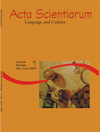<b>Questões discursivas para avaliação escolar</b> - DOI: 10.4025/actascilangcult.v30i2.425
Resumo
O objetivo deste artigo é descrever questões discursivas presentes em atividades escolares do Ensino Médio para avaliação da aprendizagem. Foram estudadas, à luz de teorias sobre atividades e tarefas escolares (Chartrand, 2002), sobre elaboração de provas e exercícios (Moretto, 2005; Bloom, 1973) e sobre perguntas de compreensão (Marcuschi, 1996), 93 questões recolhidas nas disciplinas Literatura Brasileira, História e Geografia. Foram descritas questões (des)contextualizadas, propondo, do ponto de vista cognitivo, tarefas funcionais (predominantes), seguidas de formativas e metacognitivas. Seus comandos são dados por meio de pronomes interrogativos (principalmente) e de verbos no imperativo ou no infinitivo. As questões focalizam os conteúdos específicos das disciplinas, privilegiando seus conceitos, e enfatizam o desenvolvimento cognitivo dos alunos, sem relação com aspectos sociais. Parece ser suficiente a demonstração passiva de conhecimentos como resultado de uma aprendizagem correspondente a acúmulo de informações e de um ensino entendido como repasse de dados.Downloads
DECLARAÇÃO DE ORIGINALIDADE E DIREITOS AUTORAIS
Declaro que o presente artigo é original, não tendo sido submetido à publicação em qualquer outro periódico nacional ou internacional, quer seja em parte ou em sua totalidade.
Os direitos autorais pertencem exclusivamente aos autores. Os direitos de licenciamento utilizados pelo periódico é a licença Creative Commons Attribution 4.0 (CC BY 4.0): são permitidos o acompartilhamento (cópia e distribuição do material em qualqer meio ou formato) e adaptação (remix, transformação e criação de material a partir do conteúdo assim licenciado para quaisquer fins, inclusive comerciais.
Recomenda-se a leitura desse link para maiores informações sobre o tema: fornecimento de créditos e referências de forma correta, entre outros detalhes cruciais para uso adequado do material licenciado.




















6.png)









